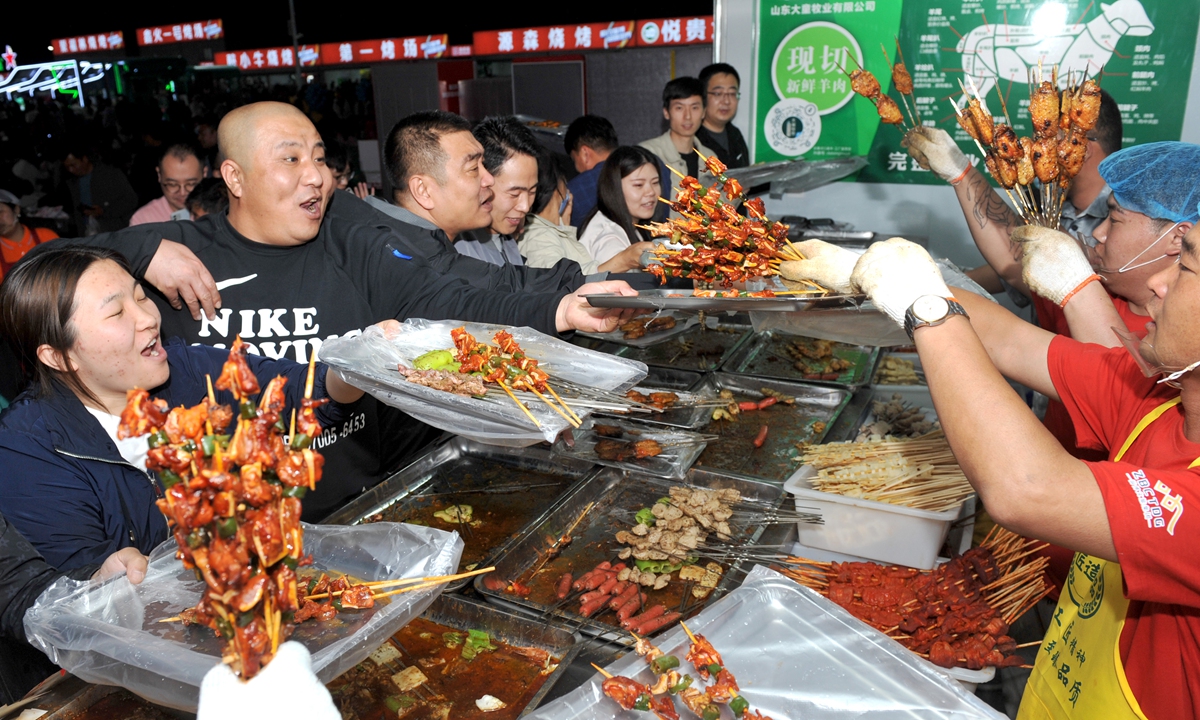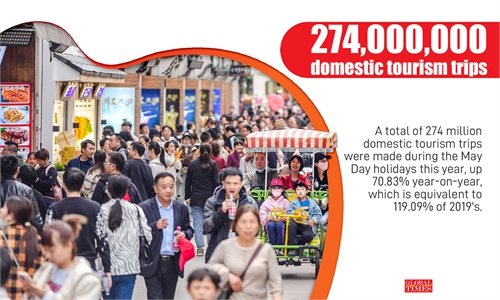Retailers hold high expectations for sector's ongoing recovery in May: survey
Spending remains strong engine for China's 2023 GDP growth

Visitors flock to a barbecue stall in Zibo, Shandong Province on April 29, 2023. Photo: VCG
Retailers in China hold high expectations and confidence in the sector's steady recovery in May, a latest industry survey showed, indicating that consumption is coming back strong with the continuous expansion of domestic demand in the post-COVID period in the world's second-largest economy.
The China Retail Prosperity Index (CRPI), a leading indicator that shows retailers' expectations for the sector, edged up 0.3 points to 51.1 in May, staying in expansion territory for the fifth month, a survey conducted by the China General Chamber of Commerce showed on Saturday.
The commodity management index came in at 50.8, down 0.1 points from the previous month. The leasing business index stood at 52.2, up 0.3 points from April while the e-commerce business index was 51.2, up 1.2 points.
The consecutive expansion of the CRPI showed that the recovery in the retail sector is picking up momentum and retailers have a bright outlook for its future growth, the chamber said.
The sub-index showed that with the peak online consumption season coming, e-commerce operators are becoming more confident in their business recovery and consumers are becoming more willingly to choose online channels, it added.
With the steady rebound of the domestic economy and the driving effect of the just-ended May Day holidays, domestic consumption is expected to continue to release huge potential, becoming a major engine to drive the country's economic growth this year, experts said.
"It is within expectations that retailers are betting on the upward trend as China has huge market potential. The country has a big population and a growing middle-income group with significant spending power," Cong Yi, a professor at the Tianjin University of Finance and Economics, told the Global Times on Sunday.
The structural upgrade of consumption is also underway, he noted.
In contrast to many traditional supermarkets that are facing business difficulties or withdrawing from the Chinese market due to e-commerce and the pandemic, the business of membership-only retailers has proven robust, reflecting the country's consumption upgrades.
US big-box retailer Costco opened its second members-only store in Shanghai on March 10, its third outlet in the country. The supermarket capped shopper numbers at 20,000 on its first trial day, remembering that more than three years ago when it opened its first store in the city there was huge traffic.
Costco aims to open four new shops in China this year.
Cong said that when there's enough supply, domestic demand will surely be released continuously.
He gave the example of Zibo, which has gone viral on Chinese social media recently. The city, located in East China's Shandong Province, has become so famous for its local specialty barbecue that it has set up special tourist trains and bus routes to attract visitors.
It attracted more than 120,000 people from across the country during the May Day holidays, the highest for nearly a decade, media reports said.
China's economic rebound in the post-pandemic period has proven better than expectations. GDP grew by 4.5 percent in the first quarter from a year ago with consumption contributing around two-thirds of economic output. In March alone, retail sales jumped 10.6 percent year-on-year, data from the National Bureau of Statistics (NBS) showed.
"The features of first-quarter economic data are likely to continue for the remainder of the year," Cong said.
The contribution of consumption to GDP growth is expected to maintain its current status in the second quarter at around 60 percent, Li Yong, a deputy chairman of the Expert Committee of the China Association of International Trade, told the Global Times.
The May Day holidays also injected impetus into the economy in an efficient way, bringing a boom to the Chinese consumer market, Li said.
According to data released by the Ministry of Culture and Tourism on Wednesday, 274 million domestic trips were made during the holidays, with domestic tourism revenue reaching 148.06 billion yuan ($21.42 billion), both indicators surpassing the 2019 pre-COVID levels.
From the start of this year, with policies aiming to promote consumption rolled out, sales saw a significant recovery, especially in the services, Fu Linghui, a spokesperson of the NBS, told a press conference in April.
"In the near term, consumption as a driver of GDP growth will remain dominant," Fu said, adding that the country will spare no effort to increase personal incomes, provide high-quality supply, effectively combine expanding consumption with supply-side structural reform, and unleash consumption potential.



